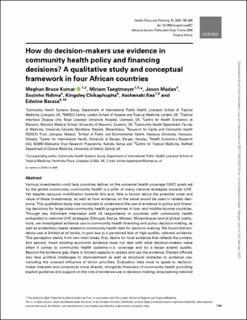| dc.description.abstract | Various investments could help countries deliver on the universal health coverage (UHC) goals set by the global community; community health is a pillar of many national strategies towards UHC. Yet despite resource mobilization towards this end, little is known about the potential costs and value of these investments, as well as how evidence on the same would be used in related decisions. This qualitative study was conducted to understand the use of evidence in policy and financing decisions for large-scale community health programmes in low- and middle-income countries. Through key informant interviews with 43 respondents in countries with community health embedded in national UHC strategies (Ethiopia, Kenya, Malawi, Mozambique) and at global institutions, we investigated evidence use in community health financing and policy decision-making, as well as evidentiary needs related to community health data for decision-making. We found that evidence use is limited at all levels, in part due to a perceived lack of high-quality, relevant evidence. This perception stems from two main areas: first, desire for local evidence that reflects the context, and second, much existing economic evidence does not deal with what decision-makers value when it comes to community health systems—i.e. coverage and (to a lesser extent) quality. Beyond the evidence gap, there is limited capacity to assess and use the evidence. Elected officials also face political challenges to disinvestment as well as structural obstacles to evidence use, including the outsized influence of donor priorities. Evaluation data must to speak to decision-maker interests and constraints more directly, alongside financiers of community health providing explicit guidance and support on the role of evidence use in decision-making, empowering national decision-makers. Improved data quality, increased relevance of evidence and capacity for evidence use can drive improved efficiency of financing and evidence-based policymaking. | en_US |

